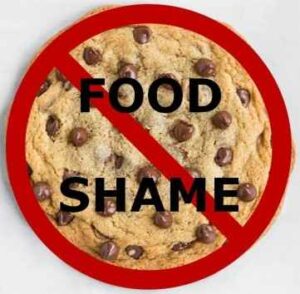Do you ever feel like you can’t control what you eat? That even though you’re not really hungry, you just can’t resist that piece of cake or bag of chips? If so, then you may be struggling with shame eating. This is a common problem that many people face, but there are ways to overcome it. In this blog post, we will discuss the causes of shame eating and how to stop it from ruining your life!
Contents
What Is Shame Eating?

Shame eating is a type of emotional eating characterized by feelings of guilt, shame, and self-hatred. It is one of the most common forms of disordered eating in our society today, and it can be incredibly damaging to your physical and mental health. For example, shame eating is often driven by feelings of shame and self-doubt. When you are constantly berating yourself for your weight, your appearance, or other aspects of your life, it can be difficult to resist the urge to eat mindlessly and comfort yourself with food.
At its core, shame eating is a coping mechanism. It helps you to distract yourself from your negative feelings and numb the pain of self-loathing. However, this comes at a great cost, both physically and mentally. Shame eating can lead to weight gain, chronic health problems, low self-esteem, and other serious issues that can take a toll on your well-being.
Symptoms
There are various symptoms of shame eating. These are as follows:
- feelings of guilt and shame around food
- a tendency to eat mindlessly, often in response to negative emotions or stress
- constant self-criticism and self-judgment around your body and/or weight
- difficulty regulating your food intake, leading to cycles of restrictive eating followed by binges and overeating
These are symptoms that are common among shame eaters, and they can be very difficult to deal with.
What Triggers Shame Eating?

Shame eating can be triggered by many different things: stress, anxiety, boredom, loneliness, sadness – you name it. And while it may temporarily relieve negative emotions and make us feel better in the moment, the negative consequences of shame eating far outweigh any perceived benefits.
At its core, shame eating is a coping mechanism that we use to deal with difficult emotions like stress and anxiety. We may turn to foods that are high in sugar or fat when we are feeling down because they make us feel good in the short term – they boost our mood and give us a sense of comfort and relief.
Shame eating is often the result of deep-rooted issues and negative emotions, such as low self-esteem, insecurity, and feelings of inadequacy. This includes as follows:
- Being bullied or teased as a child can lead to feelings of self-doubt and insecurity.
- Experiencing trauma, such as a serious illness or the loss of a loved one, can leave you feeling vulnerable and overwhelmed.
- Having unrealistic expectations of yourself and others, which can cause feelings of disappointment and failure.
- Feeling inadequate or unworthy in comparison to others can lead to feelings of jealousy and envy.
- Cultural messages about body size and weight, which place a huge emphasis on thinness as the ideal body type, but also often encourage us to restrict our food intake or “punish” ourselves for eating certain foods
- Social pressures and expectations can make it difficult to break out of unhealthy eating patterns or feel comfortable in your body
- Negative beliefs about food and weight, such as the belief that eating “bad” foods will make you gain weight or that restricting your food intake is necessary for maintaining a healthy body size.
In order to overcome shame eating, it is important to identify the underlying causes and work on addressing them. This may involve seeking professional help from a therapist or counselor, who can guide you through the process of healing and self-discovery.
How Can You Overcome Shame Eating?

There are a number of different strategies that you can use to overcome shame eating and reclaim your health and well-being. Some of the most effective methods include:
Seeking professional counseling or therapy. Talking through your emotions with a therapist can help you get to the root cause of your shame eating and develop strategies to manage it. It includes:
Medication
One common form of shame eating is the use of medication to self-soothe. Many people who struggle with feelings of intense shame or self-hatred turn to drugs or alcohol as a way to numb their pain and escape from their negative thoughts and emotions.
However, this strategy is often only temporary, as these substances can actually exacerbate feelings of shame and self-loathing in the long run.
Therapy or Counseling
Therapy or counseling helps in many ways, including addressing shame eating. By working with a therapist or counselor, you can learn more about the underlying causes of your shame eating and develop strategies to overcome it.
Some common therapeutic approaches that have been shown to be effective in dealing with shame eating include cognitive-behavioral therapy (CBT), dialectical behavior therapy (DBT), and acceptance and commitment therapy (ACT). In these approaches, you will learn about the link between your thoughts, feelings, and behaviors related to eating, as well as tools and techniques to help manage your negative emotions in a healthier way.
Practicing mindful or intuitive eating
Mindful eating involves paying attention to your hunger cues and engaging in conscious, intentional eating habits. Intuitive eating takes this one step further by allowing you to tune into your body’s natural rhythms of hunger and fullness, rather than following restrictive diet rules or standards. For instance, if you are feeling particularly hungry and start to reach for a snack, stop and ask yourself whether or not you are truly hungry. If the answer is yes, then follow your natural urge and eat something that will satisfy your hunger.
But what happens when we don’t listen to our body’s hunger cues? Oftentimes, this can lead to shame eating, which is the act of indulging in food as a way to make ourselves feel better or cope with our feelings.
Finding a supportive community or group
Whether it’s an online support group, a weight loss challenge, or simply a friend who understands what you’re going through, having the support of others can be instrumental in overcoming shame eating. For instance, connecting with others who have also struggled with shame eating can be a powerful way to find support and encouragement as you work to overcome this destructive behavior. Shame is an incredibly painful emotion, and often we try to cope with it by turning to food. But the truth is that shame alone does not cause us to eat excessively.
Engaging in self-care activities
Taking care of yourself by getting enough sleep and exercise, engaging in enjoyable activities, and practicing healthy habits can all help you build a stronger sense of self-worth and confidence. For instance, getting enough sleep can help you feel more energized and alert, while regular exercise is great for your physical health as well as your mental well-being.
Ultimately, the best way to overcome shame eating is to be mindful of your thoughts, feelings, and behaviors. By acknowledging and accepting your emotions, you can learn to regulate them more effectively. You can also seek out support from friends, family members, or professional counselors who can help you navigate the challenges of shame eating. With time and dedication, it is possible to overcome this destructive behavior.
If you are struggling with shame eating, know that there is hope. With the right tools and strategies, you can overcome this harmful pattern and start living a healthier, happier life. Remember to be patient with yourself along the way – change doesn’t happen overnight, but with persistence and commitment, you can achieve your goals.
Conclusion
It may be concluded that shame eating is a complex phenomenon that involves many different factors. There are many underlying causes of shame eating, such as emotional distress, unmet needs, impulsive behavior, and social pressures. Additionally, there are also various strategies for dealing with shame eating, such as practicing self-compassion and seeking professional help.
For more customized assistance, please contact Therapy Mantra. Our professionals are experienced in this area and can help you take the necessary steps to improve your situation. Get in touch with us right away to learn more about our services. You may also make an online therapy session or download our free Android or iOS app.


